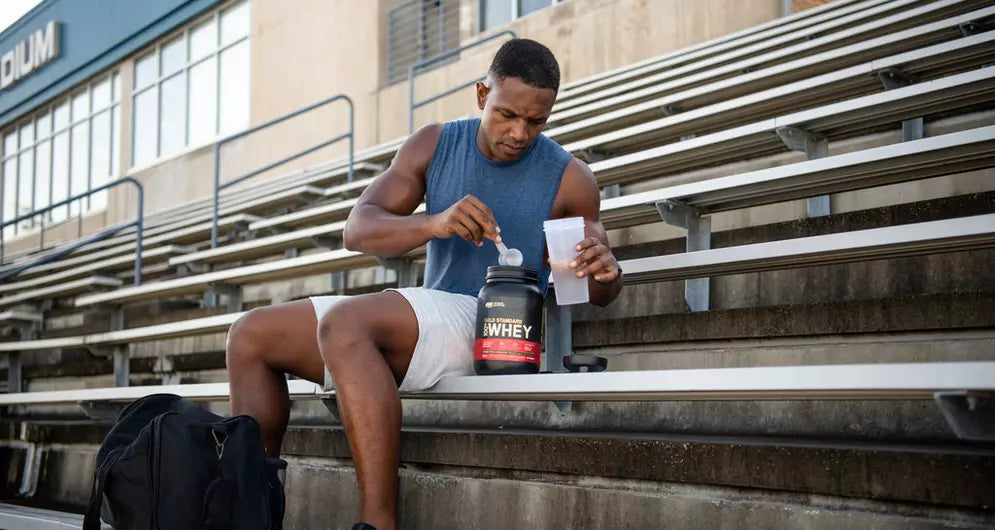Key Learnings
- Calories and Muscle Building: Muscle building hinges on a balance between caloric intake and caloric expenditure. Calories are a measure of energy, and you need to provide your body with enough energy to grow.
- Total Daily Energy Expenditure: Balancing your caloric intake (food and drink) with your total daily energy expenditure (TDEE) is crucial. TDEE is the sum of your basal metabolic rate, the energy used in digesting food, and physical activity.
- Calorie Surplus Amount: To effectively build muscle, aim for a caloric surplus, typically an additional 250-500 calories above your TDEE. Use our protein calculator to learn how many calories you need to support your muscle building goals. This surplus, however, is not a one-size-fits-all; it varies individually and requires careful monitoring and adjustments.
- Tracking Progress: Consistent tracking is vital. This includes monitoring your weight – with an ideal target of about 0.5 kilograms of weight gain per week – and using visual feedback like progress photos.
- Practical Tips: Calculating your TDEE, and your calorie intake and tracking your weight or visual progress can help you make changes to your plan over time.
Introduction
At the core of muscle building is a simple yet often misunderstood concept: the balance between calorie intake and expenditure. Calories are the energy units that fuel our bodies for every activity, from basic bodily functions to intense physical exercise. For muscle growth, the right number of calories, along with proper nutrition and resistance training, is essential.
Calories and Muscle Building
Calories play a crucial role in muscle building. They provide the energy required for your workouts and the raw materials needed for muscle repair and growth. Consuming too few calories can lead to muscle loss, while too many can lead to unwanted fat gain. Thus, striking a balance is key.

Total Daily Energy Expenditure
Understanding total daily energy expenditure (TDEE) is pivotal when trying to gain muscle mass. TDEE is the total number of calories your body burns in a day, encompassing various components: Basal metabolic rate (BMR), the energy used for basic bodily functions at rest; the thermal effect of food (TEF), which is the energy used to digest and metabolise food; and the energy expended during physical activity, including both planned exercise and non-exercise activity thermogenesis (NEAT), such as walking or fidgeting. Knowing your TDEE is crucial because it represents the baseline number of calories you need to maintain your current weight. To gain muscle, you must consume more calories than your TDEE – a concept known as a caloric surplus. However, it’s not just about eating more; the ‘quality’ of the surplus also matters. A well-planned diet, rich in protein, healthy fats, and complex carbohydrates, in conjunction with a structured resistance training program, ensures that the extra calories contribute to muscle growth rather than excessive fat gain Balancing your TDEE with a targeted caloric surplus is therefore a delicate and vital part of any effective muscle-building strategy.
Components of TDEE
Basal Metabolic Rate (BMR) and Muscle Building
Your Basal Metabolic Rate (BMR) is the number of calories your body needs to perform basic functions at rest, such as breathing, repairing your cells, and hormone production. It’s influenced by factors like age, gender, weight, height, and body composition (the balance of muscle mass and fat mass in your body). Understanding your BMR is crucial because it forms the foundation of how many calories you need daily. For muscle building, you’ll need to consume more calories than your BMR to provide enough energy for your workouts and the muscle-building process. To learn what your estimated calorie requirements are to support your muscle building goals check out our protein calculator or engage your brain and following the calculation flow below starting with estimating your BMR using the Harris-Benedict BMR equations below:
Men: BMR = 88.362 + (13.397 x weight in kg) + (4.799 x height in cm) – (5.677 x age in years)
Women: BMR = 447.593 + (9.247 x weight in kg) + (3.098 x height in cm) – (4.330 x age in years)
Physical Activity Level Multipliers
To estimate your total calorie expenditure, multiply your RMR by a Physical Activity Level (PAL). PAL multipliers are:
BMR x 1.2 (sedentary)
BMR x 1.375 (exercise lightly one to three times per week)
BMR x 1.55 (exercise three to five times per week)
BMR x 1.725 (exercise six or seven days per week)
BMR x 1.9 (exercise seven days per week and also have a physically demanding job.
The Thermic Effect of Feeding
The Thermic Effect of Food (TEF) contributes to Total Daily Energy Expenditure (TDEE) by accounting for calories burned during digestion and absorption of food. Typically, TEF comprises about 10% of TDEE.
Calorie Surplus Amount
The optimal caloric surplus for muscle building, while minimising fat accumulation, varies between individuals and involves a degree of trial and error. Typically, consuming an additional 250-500 calories above your Total Daily Energy Expenditure is recommended. However, individual differences in metabolism, activity levels, and body composition mean that the ideal surplus can differ. It requires attentive monitoring and adjustments over time2. Building muscle isn’t just about the total number of calories; the source of these calories is equally important. Macronutrients, namely proteins, carbohydrates, and fats, play important roles in muscle building. Our protein calculator will also give you an estimate of how much of each you require based on your goals. Proteins are vital for muscle repair and growth, carbohydrates are the primary energy source for your resistance training workouts, and fats support the caloric surplus3. For some it can be challenging to eat enough calories, protein, and carbohydrate to hit daily requirements for muscle building. In these instances, a muscle gainer, such as Serious Mass can be a convenient option to get high quality calories to support muscle gain and performance goals.
Exercise and Caloric Needs
The type and intensity of your exercise routine significantly impact your caloric needs. Strength training and high-intensity workouts can increase you muscle mass and, consequently, your calorie requirements4. It’s important to adjust your calorie intake based on your workout regimen to ensure that your body has enough energy for muscle growth and recovery.
Measuring Your Calorie Intake Using Dietary Intake Applications
Tracking your calorie intake is made easier with dietary intake applications. These apps can help you log your daily food intake, providing insights into your calorie consumption and nutritional balance. Accurate tracking is vital in ensuring you’re consuming enough calories and the right balance of macronutrients for muscle growth.
Tracking Progress
Tracking progress while building muscle is important for ensuring that your diet and exercise strategies align with your goals of building muscle. Central to this tracking is monitoring your weight, a straightforward yet effective method. Ideally, in a calorie surplus aimed at muscle gain, the suggested rate of weight increase is about 0.5 kilograms per week. This slow rate of weight increase gives you the best chance at of gaining muscle mass and reducing fat accumulation, alongside a well-structured resistance training program.
In addition to regular weight checks, visual feedback can help people track their progress. Taking regular photos and observing changes in muscle tone and body composition offers motivation if the number on the scales isn’t changing. Visual changes can often provide a more comprehensive understanding of progress than numbers on a scale alone, as muscle growth can sometimes be masked by fluctuations in water weight or body fat.
Moreover, these visual cues, combined with consistent weight monitoring, help in fine-tuning your dietary and workout plans. If the rate of weight gain exceeds the target of 0.5 kilograms per week, it might indicate an excessive caloric intake, prompting a dietary adjustment. Conversely, if weight gain is slower than expected, it may signal the need for a higher calorie intake or a change in training intensity. Consistent tracking, both through weight and visual assessments, is thus a fundamental aspect of a successful muscle-building journey
Practical Tips for Daily Application
Start with your TDEE: Calculate your BMR and adjust based on your activity level.
Monitor and adjust: Track your diet for 2-3 days using an application to estimate your calorie intake. Adjust your dietary intake to put yourself in a caloric surplus.
Track your progress: Track your weight once or twice a week to ensure you are gaining weight, and therefore in a calorie surplus.
Focus on nutrient-rich foods: Prioritize whole, nutrient-dense foods for your calorie sources.

Conclusion
Understanding and managing your caloric intake is a fundamental aspect of building muscle mass. By considering factors like BMR, exercise, lifestyle, and physical activity and using tools like dietary tracking apps, you can tailor your diet to effectively support muscle growth. Remember, consistency and attention to your body’s needs are key to achieving your muscle-building goals.
References
- Donahoo, W. T., Levine, J. A., & Melanson, E. L. (2004). Variability in energy expenditure and its components. Current Opinion in Clinical Nutrition & Metabolic Care, 7(6), 599-605.
- Aragon, A. A., & Schoenfeld, B. J. (2020). Magnitude and composition of the energy surplus for maximizing muscle hypertrophy: Implications for bodybuilding and physique athletes. Strength & Conditioning Journal, 42(5), 79-86.
- Tesch PA, Colliander EB & Kaiser P (1986) Muscle metabolism during intense, heavy-resistance exercise. Eur J Appl Physiol Occup Physiol. 55:362–6.







